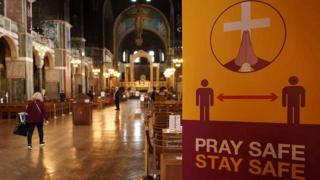 Image copyright
Getty Images
Image copyright
Getty Images
Places of worship in England have reopened for services for the first time since lockdown began.
Worshippers of all religions are likely to notice changes to the usual practices.
What has the government said?
The guidance says gatherings of more than 30 people are now allowed for acts of communal worship in churches, synagogues, mosques, temples and meeting rooms in England.
Everyone attending the service should stick to social distancing guidelines. In other words, they should keep at least 1m (3ft) - and ideally 2m (6ft) if possible - away from anyone not from their own household or support bubble.
A risk assessment will have to be carried out at each place of worship. This will also determine the number of people allowed to take part in a service.
But no more than 30 people will be allowed to attend weddings, funerals and other "life cycle events" such as bar mitzvahs or baptisms.
What else has changed?
Services should be carried out in the shortest possible time - to ensure safety and minimise infection spread People should be "encouraged to move on promptly" afterwards If shoes are removed before a service, people should avoid touching other people's There should be no shared items such as prayer mats, service sheets, religious texts or hymn books - worshippers should bring their own and then take them home If people can't bring their own books, places of worship can offer a selection for individuals to use - these should be quarantined for 48 hours before and after use Those giving and receiving food and drink in a service will have to observe strict precautions Spoken responses from worshippers should be uttered softly and communal singing avoided to reduce the risk of transmission If singing is an essential part of the service, and a recording can't be played, only one person should sing - preferably behind a plexi-glass screen, or facing away from the congregationThe decision to reopen places of worship has been broadly welcomed by religious leaders, although they are approaching it with different degrees of caution.
Image copyright Getty ImagesAnglican churches
The Bishop of London, Rev Sarah Mullally, who has been in charge of the Church of England's plans for resuming services, said: "We will not be returning to normality overnight."
The Church of England says it will continue online services for those who still cannot attend services.
There are also restrictions on the giving and receiving of Holy Communion:
No sharing of wine - it will be handled and drunk (and the chalice cleaned) by the priest alone The bread host only to be received by hand, not in the mouth The priest (and any helpers) to use hand sanitiser before and after giving communion, and those receiving it to be encouraged to do the sameAmong other restrictions, worshippers will not shake hands during the Sign of Peace.
Roman Catholic churches
The Roman Catholic Church's rituals are similar in many ways to the Church of England, and its guidelines are broadly the same as those outlined above.
The Catholic Bishops Conference of England and Wales also says there should be no offertory procession or collection, and parishioners should be encouraged to give online instead.
Since the crisis began, Roman Catholics have been freed from their obligation to celebrate Mass every Sunday. Cardinal Vincent Nichols - the Church's leader in England and Wales - has said this will continue despite the changes.
Mosques
The Muslim Council of Britain (MCB) says it advises worshippers against a quick return to normal, especially since the Muslim community has been among the worst affected by coronavirus in England.
"Mosques must not feel rushed into re-opening," says the MCB's secretary general, Harun Khan, "but should only take this step when they feel it is safe to do so."
Its plan for safe reopening advises worshippers to wear face masks and bring their own prayer mat, Quran, and a reusable shoe bag.
Image copyright Getty ImagesHindu temples
The Hindu Council UK says temples will have discretion as to when they reopen.
It has also recommended that gatherings are restricted to 30 people or fewer, and that communal singing is avoided for the time being.
Synagogues
Jewish reaction - both liberal and orthodox - has been cautious. Chief Rabbi Ephraim Mirvis said reopening was not a single event "but rather a cautious, phased process" that would take place over the course of months.
The United Synagogue has issued a list of practical considerations for reopening safely. This includes:
An online booking system for attendance at synagogue No kissing of holy books or objects, and no handshaking Face masks to be worn inside Singing to be restricted to the service leader, who will face away from the congregationWhat about the rest of the UK?
Places of worship in Northern Ireland have been allowed to open for communal services since 29 June.
There is currently no date for the resumption of services in Scotland and Wales.

 5 years ago
780
5 years ago
780 

